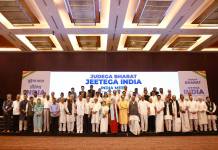After taking some of the best of bowling attacks to the laundry, batting legend Sachin Tendulkar on Tuesday took up UNICEF’s ‘Wash in School’ project in Sri Lanka.
The most decorated batsman in the cricket history told school children in Colombo that using soap for washing hands before meals could protect them from many diseases.
“A simple act of washing hands with soap can keep children safe and healthy and protect them against these deadly (diarrhoeal) diseases,” Tendulkar, a goodwill ambassador for the United Nations Children’s Fund, or UNICEF, told reporters at a function in Colombo.
“My mother never allowed me to eat before washing hands. We must ensure all children learn such habits,” Tendulkar was quoted as saying by official twitter handle of UNICEF Sri Lanka on Tuesday.
Tendulkar himself took to twitter to spread the message.
“I’m batting for @UNICEF against diarrhoeal diseases in e second innings of my life. With #cricket I had 11 in my team but in fighting diarrhoeal diseases we are all team players!” he tweeted. “Am teaming up with Murali to dismiss diseases in #SriLanka! Join us to promote good #hygiene and #sanitation!”
Tendulkar and Sri Lankan spin legend Muttiah Muralitharan, who was also part of Tuesday’s programme, aim at inculcating this habit in children so the number of deaths due to poor sanitation could be reduced in south Asia.
According to the UNICEF, about 1,800 children aged under five years of age die every day worldwide.
UNICEF said South Asia had made considerable progress in the past two decades, with the proportion of people using toilets increasing from 20 percent in 1995 to 45 percent by this year.
“The number of people not using a toilet in South Asia is still huge with 64 percent of the world’s open defecators living in the region. A total of 610 million people in South Asia do not have toilets,” UNICEF said.
In Sri Lanka, some 14 percent of households in the nation of 20 million lack toilets, UNICEF said.
















